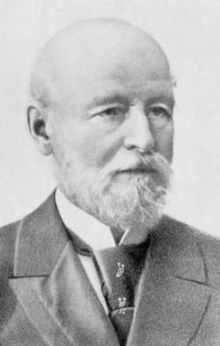Botho zu Eulenburg
| Count Botho zu Eulenburg | |
|---|---|

Count Botho zu Eulenburg
|
|
| Prime Minister of Prussia | |
|
In office 22 March 1892 – 26 October 1894 |
|
| Monarch | Wilhelm II |
| Preceded by | Count Leo von Caprivi |
| Succeeded by | Prince Chlodwig zu Hohenlohe-Schillingsfürst |
| Personal details | |
| Born |
31 July 1831 Wicken/Bartenstein, East Prussia |
| Died | 5 February 1912 (aged 80) Berlin, Imperial Germany |
| Spouse(s) | Elisabeth von Alvensleben |
| Children | Botho zu Eulenburg (1879–1881) |
| Occupation | Jurist |
| Religion | Lutheran |
Botho Wendt August Graf zu Eulenburg (31 July 1831 – 5 February 1912) was a Prussian statesman.
Eulenburg was born in Wicken near Bartenstein to Botho Heinrich zu Eulenburg (1804–1879) and Therese née von Dönhoff (1806–1882). He studied law at the universities of Königsberg and Bonn.
Eulenburg worked in high positions of the Prussian and German administration in Wiesbaden (1869–1872), Metz (president of the Département de la Lorraine; 1872–1873) and upper president of the Province of Hanover (1873–1878). In March 1878 Eulenburg succeeded his first cousin once removed Friedrich Albrecht zu Eulenburg as Minister of the Interior, serving under Bismarck. He implemented a series of repressive anti-socialist measures. From 1881 to 1892 he was the president of the province of Hesse-Nassau.
In 1892, he was appointed Prime Minister of Prussia in succession to Leo von Caprivi, who however remained Chancellor of Germany.
Though Caprivi had recommended the experienced administrator Eulenburg for this appointment, the new prime minister soon made life difficult for Caprivi, and often thought of pressing for his removal. Both Caprivi and Eulenburg were eventually dismissed by Wilhelm II following the renewal of anti-Socialist moves (and an anti-subversion bill) in 1894. Eulenburg often thought of himself as the only possible successor to Caprivi, and he was extremely unhappy to be dismissed at what he regarded as the moment of his destiny.
...
Wikipedia
